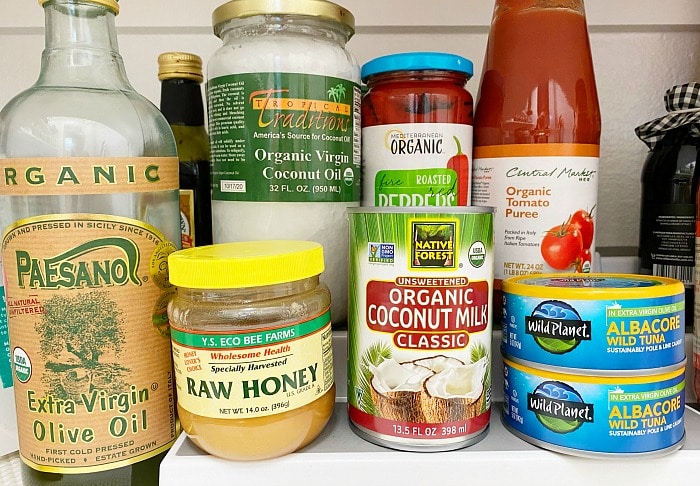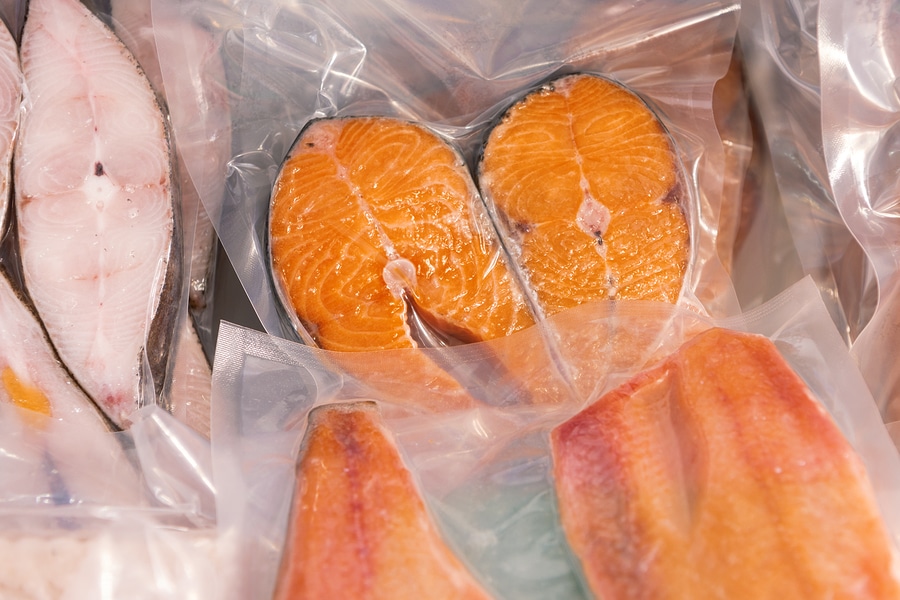Healthy pantry staples are important to have on hand. I realize that if you’re on a restrictive diet this can be stressful, so I thought it would be helpful to have a list of foods that offer lots of nutrients but can be kept on hand for longer periods of time.
If there comes a time when food becomes scarce, it’s important to remember to do the best you can when it comes to your diet. Stress weakens the immune system and can have much more of a negative impact on the body than actually eating some foods that you had previously been restricting.
So, take a deep breath… and now let’s dive into our list of healthy pantry staples!
Healthy Pantry Staples:
Coconut Milk – This is great for making smoothies, adding to soups, making homemade yogurt, or for adding to your coffee or tea.
Rice (if you can tolerate) – Rice can keep in the pantry for several years, so it’s a great food to have on hand. To get the most nourishment out of your rice, I recommend soaking it prior to cooking. Here are instructions on how to do this.
Bone Broth – Kettle and Fire bone broth can be kept in the pantry and will keep for many months.
Nuts and Seeds – I recommend purchasing nuts and seeds raw and then soaking and dehydrating them yourself. Sprouted is also a good option.
Gluten-Free Pasta – My go-to pasta brand is Jovial because they soak the brown rice overnight to reduce the anti-nutrients before making their products. Banza is also a good grain-free option for pasta.
Jarred Tomatoes – Whether they are diced, pureed or whole, they are a fabulous pantry staple to use in soups, stews, pasta sauce, etc. I recommend Bionaturae or Jovial tomatoes.
Homemade or a Good Quality Mayonnaise – This can be used to make creamy salad dressings, sandwiches with sourdough (if you can tolerate) or to dip vegetables or meats in. It’s not a necessity, but can add lots of flavor to your meals! Sir Kensingtons is my go-to store-bought mayo and here’s a great homemade mayonnaise recipe.
Canned Seafood – Wild canned or jarred seafood like salmon, tuna, sardines, and anchovies are abundant in nutrients like Vitamin D, A, omega-3 fatty acids and minerals that support the immune system. You can eat them straight out of the jar, add to salads and sandwiches, make salmon cakes, or put on top of homemade pizza. Safe Catch or Wild Planet are two brands that I recommend when you can find them.
Wheat Flour for Sourdough – Keeping organic white and whole wheat flour in the pantry (or storing in the freezer) is helpful to make fermented sourdough breads.
Grain-Free Flours – Flours such as coconut, almond, arrowroot, and tapioca are helpful to have on hand for grain-free baking.
Olives – great for snacking and adding to recipes.
Plantain chips – These chips are a great grain-free option when you want something salty and crunchy to snack on!
Dried Meats – Dried grass-fed meat like beef jerky, Chomp Sticks, and Epic Bars are great staples that can be kept at room temperature for many months.
Dried fruit – great for snacking.
Squashes – Squashes like spaghetti, butternut, and acorn can last 1-2 months when stored in a cool and dark place.
Onions and Shallots – These will last in the pantry for up to 2-3 months.
Garlic – Garlic can be stored in a cool, dark spot in your home for up to 3-5 months. You can also dice it up and freeze it in individual servings in an ice cube tray. Then, if you need to add some to a recipe, you can just use one cube from the freezer.
Potatoes – These can be stored in a cool dry spot in your house (a closet if needed!) and be kept for up to 3-5 weeks.
Legumes and lentils – These can keep in the pantry for 3-5 years. To get the most nourishment from the legumes or lentils, I recommend soaking them prior to cooking. Here are instructions on how to do this.
Spices and Herbs – Garlic, thyme, Herbamare (my favorite all-purpose organic seasoning blend), Italian seasoning, onion powder, etc. can keep for about 4 years in the pantry.
Celtic Sea Salt – This salt contains over 80 different minerals, helps replace electrolytes, provides the body with necessary sodium and potassium, and of course, helps season your food.
Nut Butters – These are great for snacking and can be kept in the pantry for about 2-3 months unopened.
Coconut Oil – This oil has many antiviral and antibacterial properties and is fabulous to keep stocked in your pantry for cooking and baking.
Refrigerated or Frozen Foods
Apples – A good fruit to keep on hand in the fridge for a few weeks.
Citrus – Oranges, lemons, limes, etc. can keep in the fridge for many weeks.
Yogurt – A whole milk, unsweetened yogurt can last for many weeks in the refrigerator. Some of my favorite brands are Stonyfield, Kalona, Nancy’s, and Strauss.
Kefir – This probiotic drink also lasts for many weeks in the fridge. I recommend looking for one that does not contain any preservatives or sugars. Wallaby is one of my favorite brands.
Bone Broth or Meat Stock – Homemade broth or a store-bought brand such as Bonifide broth can keep in the freezer for about 6 months.
Eggs – Eggs can be frozen for about 6-8 months. You can either separate the whites and yolks and freeze, or you can whisk the eggs and freeze in a container.
If you like to bake, I recommend freezing individual whites and yolks in an ice cube tray and then transfer to a freezer safe container. This way you can pull out yolks or whites individually.
Fermented Vegetables – When fermented, foods like sauerkraut and kimchi are a wonderful source of Vitamin C and B vitamins and probiotics, and they keep in the fridge for about 6 months.
Cooked Rice – You can cook rice and then store it in the freezer for up to 6 months.
Soups and Stews – If you have room in your freezer, I recommend making some nutrient-dense soups or stews and then freezing for future use. They can keep in the freezer for about 6 months.
Butter or Ghee – These healthy fats support the immune system and can be used for cooking or baking. Ghee can be purchased or made at home.
Frozen Vegetables – Spinach, broccoli, carrots, kale, green beans, and cauliflower are all good options.
Frozen Fruit – Berries, mango, and pineapple can be thawed and eaten by themselves or added to a coconut milk smoothie.
Meats – Meat like grass-fed beef, chicken, fish, etc. can keep in the freezer for about 6 months.
What staples do you like to have on hand? Let me know in the comments and I’ll continue to update this list with the ideas you share!





15 Comments